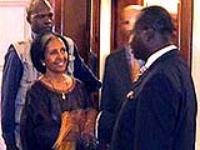
Dr Meskerem Grunitzky-Bekele UNAIDS Regional Director for West and Central Africa with President of the Central African Republic Mr François Bozizé, January 2010.
Credit: UNAIDS
The Central African Republic, one of the poorest countries in the world, has been heavily affected by the HIV epidemic. It is estimated that 160 000 people are living with HIV in the country, and only one in four of those in need have access to Anti-Retroviral Treatment (ART).
The situation for orphaned and vulnerable children in the country is dire, with assistance only provided to 2400 children, one child out every 30 who need support.
Pediatric care is almost exclusively implemented at one hospital in the capital. They currently have 630 children in their care, and national coverage only reaches one child out of 20 to 22 who requires HIV treatment.
To scale up access treatment, but also prevention, and care and support services, the Central African Republic has been awarded Global Fund grants (Rounds 4 and 7). However, the country has encountered a number of bottlenecks and structural problems with a severe effect on implementing the national response to AIDS.
Some of the most intricate obstacles include pharmaceutical stock shortages and distribution issues, minimal involvement of civil society, as well as effective financial management. This has led the Global Fund to suspend Round 7 grant disbursements and postpone the Malaria Round 8 grant signature, as precautionary measure.
This joint mission shows the importance of the UN working together with bilateral partners and civil society organizations as one to remove bottle-necks for Universal Access to HIV prevention, treatment, care and support services.
Dr Meskerem Grunitzky-Bekele UNAIDS Regional Director for West and Central Africa
To unblock bottlenecks, a joint mission was undertaken by UNAIDS, Global Fund and WHO Roll Back Malaria, ESTHER, USAID, ,French Cooperation and Grant Management Solutions to meet with government officials including the Head of State Mr François Bozizé and the Prime Minister Mr Faustin Archange Touadéra.
The delegation comprised of senior experts from key agencies working on AIDS and on Malaria in the region with an objective to ensure all requirements of the global fund round 8 are met in the country’s proposal.
In Central African Republic, the mission found conditions similar to countries in state of humanitarian emergency–running the risk of total ARV drug stock outs before the end of January 2010. This could have lead to devastating treatment interruption for people living with HIV currently accessing ART in the country.
An emergency order of 50,000 doses was submitted to the Centrale Humanitaire Médico-Pharmaceutique in Nairobi, paid directly by the Global Fund. The first shipment arrived to the country on 30 January, just one week after the joint mission, with a second shipment on scheduled for the 10 of February.
Simultaneously, the Government made a special commitment for an order for approximately 2.5 months of treatment which is expected to arrive in March 2010. In addition, the National AIDS Commission has ordered three months of treatment to be paid by the GFATM which is expected to arrive in June 2010 – this order will then be renewed on a quarterly basis.
The mission was organized within the framework of the Joint UN Regional Team on AIDS and jointly led by Dr Meskerem Grunitzky-Bekele UNAIDS Regional Director for West and Central Africa and Cyrille Dubois, Global Fund Regional Team Leader, West & Central Africa.
"This joint mission shows the importance of the UN working together with bilateral partners and civil society organizations as one to remove bottle-necks for Universal Access to HIV prevention, treatment, care and support services," Dr Grunitzky-Bekele said.
During the mission a roadmap was developed with clearly defined actions and responsibilities, which has gained widespread political support from all levels of Government and development partners.
The UN Country Team in the Central African Republic provided strong support to the mission and expressed commitment to ensure follow up of the roadmap. UNAIDS Regional Support Team for West and Central Africa continue to coordinate regional support for the implementation of the roadmap with the frame work of the Joint UN Regional Team on AIDS.




